- Home
- Alex Scarrow
Day of the Predator Page 23
Day of the Predator Read online
Page 23
she said.
‘Don’t know, is it? Great.’ He wiped at his sweating brow, smearing mud across his forehead. ‘Wel , who knows how deep is deep enough? May I have the tablet?’
She passed it down to him.
He turned the brick of clay over in his hands and studied the inscribed let ers and numbers.
So, my lit le silent messenger, you go get us some help, al right?
He bent down and placed the brick writing-side down in the cloudy water and gently pressed it deep into the mud. ‘We’re counting on you, Mr Tablet, counting on you to do your very best for us. Last as long as you can, al right? And, like my Auntie Loret a used to say, you be sure to make a good impression.’ He looked up at Becks with a grin plastered on his face amid the mud. ‘Uh? Make a good impression? See what I did there?’
good impression? See what I did there?’
She stared down at him, grey eyes cool y analytical. ‘A pun,’ she replied. ‘A single word with multiple meanings dependent on contextual framing.’
‘Aye, a pun … you know? It’s meant to be funny.’
She frowned for a moment, and then her face suddenly creased with an insincere mirth and she bel owed a mock laugh. He cringed at the sound of it.
‘Jay-zus, Becks, if it’s not funny … just don’t laugh. I’m serious – it’s embarrassing.’
She stopped immediately. ‘A rmative.’
Liam pul ed himself out of the hole as the wet sides of it began to slop down into the bot om. He and Becks scooped up handfuls of mud and silt and helped the selfl ing process until al that was left was a barely noticeable mound on the stream’s bank. Liam produced a length of bamboo and plunged it into the top and tore a ragged strip of neon green material from the bot om of his shorts. He tied it to the bamboo stalk. ‘And that’s so we’l nd it easy enough when we come back for it.’
Becks nodded. A part of the plan she’d insisted was necessary: to return to this time-stamp once everything else had been put right and retrieve every single one of the ve tablets that were being put into the ground. Liam looked downstream. The smal trickling artery of fresh water twisted and curled out of sight beyond a thicket of reeds. ‘I wonder how the others are doing?’
Kel y stood up straight and placed his hands on his tired Kel y stood up straight and placed his hands on his tired back. Their two tablets were now dug deep into the ne sand of the beach at either side of the smal cove, both marked with bamboo ags and strips of material ripped from the sleeve of his o ce shirt.
‘Done!’ He smiled at the others. There was a muted cheer from Juan, Laura, Jasmine and even Akira, a girl as shy as Edward, self-conscious about her thick accent and faltering English.
He looked up the beach towards the line of reed thickets and clusters of bamboo, and the smal delta of fresh water and silt that spread out and trickled down a fan of ow-worn grooves in the beach, down into the warm salty sea.
‘The others should be done pret y soon,’ he said. ‘Then we can head back.’
Laura’s gaze drifted to the steep peak of jungle they were going to have to ascend. ‘I wonder if those things are out there stil .’
Juan looked up. ‘We got our weapons, and we got robo-girl. We’re going to be al right.’
‘Maybe we’re safer now than we were,’ said Kel y. ‘One of them was kil ed trying to at ack us. So maybe they’re more wary of us now.’
Laura tightened the grip on her spear. ‘Yeah … I guess you’re right.’
Franklyn nished piling a smal cairn of stones around the base of the bamboo stake in the ground and looked up. base of the bamboo stake in the ground and looked up. Whitmore was leading the other two: Edward and his seemingly adopted big brother, Leonard, a hundred yards down towards another hump of silty bank they’d identi ed earlier as a good place for their second tablet.
‘You coming, Franklyn?’ the teacher cal ed out.
‘Just a sec!’ he replied. The bamboo stake kept opping over to one side and the rocks were very nearly, but not quite, holding it up. ‘I’l join you in a second!’ he cal ed back, reaching for another large river-smoothed stone. He heard it then. A soft, muted cry. Like the whimpering of a smal child. He froze, listening for it over the stirring hiss of the reeds and the chuckle of the stream. And there it was again, a lit le louder, a lit le clearer. It sounded like someone in pain.
‘Hel o?’ he replied. ‘Who’s that?’
One of the girls perhaps? Maybe slipped on a wet rock and broken something?
‘Jasmine? Laura?’
The cry again, pitiful, wretched and insistent. It seemed to be coming from the reeds. ‘Akira? Is that you?’ He stepped towards them and fancied he saw someone shifting on the ground at the base of the reeds. He pushed his way in.
‘What? Have you slipped? Hurt your –’
The form slithered back from him through the reeds and out of sight, moving in a fast – too fast for human – way. It was then his peripheral vision picked out eyes watching him intently from among the reeds to his right. It shifted him intently from among the reeds to his right. It shifted forward, silently revealing itself a mere couple of yards from him: distinct yel ow forward-facing eyes at the front of an elongated, tapering skul that sloped back over hunched bony shoulders and a hunched spine. The curious shape of its skul vaguely reminded him of the aerodynamic helmets worn by speed cyclists, or downhil skiers at the winter Olympics, only much longer, like the aliens in those DVDs his older brother kept watching over and over. It scrutinized him, perfectly stil , perfectly poised. And then its scalpel-sharp teeth parted and he saw its black tongue coiling and unfurling like a snake.
‘Aye … ammm … Fanck … leeennnnn …’ it hissed softly.
My God. This creature – he realized now, the very same reptilian hominid he had faced back up the hil side in the jungle yesterday – had remembered his name, had remembered their eeting moment of communication, the exchange of a spoken word. Something that wasn’t going to happen again on this world for tens of mil ions of years. What’s more, this thing had actual y the voice-box and the oral dexterity to reproduce a human word!
‘Yes!’ he whispered excitedly. ‘Yes … that’s me!’ He gestured to himself. ‘My … name … is … Franklyn.’
Its long tapered head tilted to one side and silently it glided a step forward out of the reeds towards him. In his rucksack, nestled at the bot om beneath the last couple of parcels of gril ed sh meat wrapped in waxy leaves, was his phone stil with some charge left on it. leaves, was his phone stil with some charge left on it. Enough, he hoped, just enough to take a few photographs and maybe a short recording of this thing actual y speaking. He eased the rucksack o his shoulders.
‘I’m just going to get something,’ he said softly, soothingly, moving slowly. ‘OK?’
The creature remained perfectly stil , yel ow eyes curiously watching his every move. He unzipped the bag and reached inside, the rank smel of sh spil ing out. The skin aps around the hominid’s nasal cavity began to twitch.
He can smel the food. Change of plan. Franklyn grasped one of the packages, pul ed it out and unwrapped it. ‘Here you are … look! Food.’ He held the smal hunk of barbecued esh out in one hand towards the creature. Further o , he could hear the voices of Whitmore and the others echoing back over the reeds, less than a hundred yards away. He was torn between hoping they’d turn up and scare the thing away, and hoping they didn’t. He could cal out to them. But then what might that trigger? An at ack? Or perhaps it would vanish for good, never to be encountered again.
He realized that would be a tragedy. Because this …
thing, this species, like every other species of dinosaur, just wasn’t going to make it. The world of dinosaurs hadn’t much time left in geological terms. A thousand? Ten thousand years? Maybe tomorrow it was going to happen: a mass extinction event, either an asteroid or a megavolcano was going to choke the world and kil every land-volcano was going to choke the world and kil every landbased speci
es larger than a dog. And this intel igent species, so close in many ways to human, closer in some than man’s own ape ancestor, was going to vanish along with al the other dumb dinosaurs. They were going to vanish without leaving a trace, would never be known about, never leave any fossil markings, never have a Latin name or be exhibited in a museum or discussed by palaeontologists. And that was the cruel est irony. Because here was something that, given just a few more mil ion years …
… could have been us.
The dominant intel igence, a reptilian version of Homo sapiens.
‘My God … you … you’re incredible,’ he whispered. The creature was now just a couple of yards from him, yel ow eyes on the hunk of meat, crouching low, its riband-spine-lined back looked so human, like the back of some size-zero catwalk supermodel or some lean gymnast.
‘… fankk … leeeen …’ it ut ered again.
Franklyn realized he had to take a picture. The species deserved some evidence, at least one shred of visual evidence, that it had once upon a time existed. He gently placed the meat on the ground in front of him then delved back into his rucksack for his mobile phone. The creature advanced another foot and then strained its long neck and curiously elongated head to sni the meat. One slender arm swept forward and a hand with three lethal-looking sickle-shaped claws tapped it, rol ed it over lethal-looking sickle-shaped claws tapped it, rol ed it over
… then casual y pushed it aside.
Its head cocked; its nostril aps puckered. And then Franklyn realized the creature wasn’t the slightest bit interested in the stale odour of the mud sh. It was smel ing him, reading his odours like a witch-doctor reading bones, like a medium reading the creased palm of a hand.
‘I-I mean no harm. I … just …’ Franklyn stut ered nervously.
Its jaw snapped open, and the tongue inside twisted and curled. ‘No harmmm …’ it mimicked.
‘Y-yes … friend … f-friend,’ said Franklyn, tapping his chest. It was now so close he could have reached out and stroked the bone-hard carapace of the front of its skul . He could feel warm, fetid pu s of air coming from its nasal cavity.
Franklyn had the mobile phone in his hand now. His eyes stil on this thing’s reptile eyes, he fumbled with the touchscreen menu and nal y got it into digicam mode and pressed the RECORD but on.
‘A species,’ he said softly, panning the cel ’s camera up and down the beast, ‘p-possibly a remote ancestor of the vvelociraptor … or more likely the smarter troodon.’ He hated that his voice was shaking like some nervous girl’s. If this was going to be a few seconds of footage that was going to make him famous … he wanted to sound like a pro, like a true hardcore adventurer, not some kneetrembling geek. ‘This species … is q-quite incredible. trembling geek. ‘This species … is q-quite incredible. Capable of copying a human v-voice …’
The hominid’s mouth suddenly snapped shut with a loud clack of teeth and then the cluster of reeds began to rustle with movement al around him.
Franklyn looked up. ‘Oh God … n-no …’
CHAPTER 51
65 mil ion years BC, jungle
Liam heard it. A brit le scream, long and ragged and then suddenly silenced. ‘Did you hear that?’
Becks nodded. ‘A rmative.’ She straightened up. ‘The hominid pack hunters may have returned. We should rejoin the others immediately.’
Liam grabbed his spear. ‘Come on.’
They splashed across the shal ow stream, kicking up fans of water, and then along the bank on the far side. No more than two hundred yards closer to the beach, that’s where Whitmore and the others had been left to place their tablets. That seemed to be where the scream had come from. Liam couldn’t tel if that one long cry had been a male or female voice, but it had rat led with horror and ended in a way that hadn’t sounded good. They splashed back across the water again to avoid another thicket of reeds as the stream weaved around a smooth boulder the size of an automobile. A minute later, up ahead, he could make out the others gathered in a group, standing closely together and studying something on the ground.
‘What happened?’ he cal ed out.
None of them replied. They looked up at him with None of them replied. They looked up at him with faces as pale as bed linen. Kel y and his group had heard the cry too and had come up from the beach. They must have arrived there only a minute or so earlier.
‘What happened?’ he cal ed out again as he and Becks splashed across the stream one last time and nal y joined them on the silty bank.
Then he saw it for himself.
Blood.
Blood everywhere, and a few tat ered shreds of clothing that he recognized as belonging to Franklyn. But no sign of the boy himself. ‘Oh no,’ he ut ered, blessing himself absent-mindedly. ‘That isn’t real y …?’
Whitmore nodded. ‘Franklyn’s. He … was … we were just down there,’ he ut ered, pointing downstream. ‘Just there … just b-beyond those reeds.’
‘Didn’t hear anything,’ said Howard. ‘Or see anything. Just heard him scream. We came up here and … he was gone. Just gone.’
It was Kel y who decided to say rst what they were al thinking. ‘Those things … it’s those things, isn’t it? They’ve damn wel come after us.’
‘We don’t know that for sure,’ said Liam. ‘There are other predators.’
‘Oh, we know,’ said Laura. She passed Liam a mobile phone, dappled with droplets of congealing blood. On the smal screen, a shaky low-resolution image looped over and over: nothing but the bright pale blue sky, and then the jerky image of something stepping over just the once. the jerky image of something stepping over just the once. But that was al he needed to recognize it: lean, almost skeletal, and that long tapering skul . The image was pale sky again, occasional y shuddering as the camera was knocked, and through the smal speaker the sound of growling, snapping teeth and the frenzied noise of something being torn to pieces.
Liam swal owed, his mouth and throat suddenly dry. He felt his face drain of blood and blanch, just like theirs now, pale as a ghost. ‘We’re leaving,’ he said quietly. ‘Leaving right now.’
‘Uh … I left my bag at the beach,’ said Juan.
‘Forget the bloody bag!’ snapped Liam. He glanced at Becks, ready to bark at her to be quiet should she decide to caution him about potential contamination. But she seemed to understand. Instead she pointed out which way they needed to go. Up the steep slope, thick jungle. ‘I wil lead the way,’ she said. ‘Recommendation: you should al remain close.’
‘Oh, don’t you worry about that,’ ut ered Liam under his breath. He pul ed one of their homemade hatchets out of his bag and hefted his spear in his other hand. ‘Everyone ready?’
The others nodded, al of them with a weapon of one sort or another in their hands. None of them keen to step back into the thick canopy of leaves and vines and dense clusters of fern leaves that could quite easily conceal death, but even less keen to remain here a moment longer.
‘So, what about Franklyn?’ asked Chan in a smal voice.
‘So, what about Franklyn?’ asked Chan in a smal voice. No one seemed to want to answer that question. The boy looked up at Howard. ‘We’re not looking for him, Leonard?’
Howard answered. ‘He’s gone, Edward. He’s gone.’
Becks nodded. ‘Correct. Information: approximate calculation – at least ve pints of blood on the ground. Franklyn cannot be alive.’
‘Come on,’ said Liam, resting a hand on Edward’s shoulder. He looked up at the sloping jungle ahead of them. ‘We should go.’
CHAPTER 52
Clay tablets, ve of them, buried deep in mud and sand, silently count the passing of years. Above, as they slumber in their own dark tombs, tides rise and fal , and individual layers of mud dot ed with the decaying bones of generations of creatures accumulate like the rings of a growing tree.
Two hundred and seventy-six thousand, nine hundred and two years after a group of Homo sapiens placed them in the ground, the planet Earth sh
udders under the impact of a rock the size of Manhat an travel ing at forty thousand miles an hour. A wave of incinerating energy spirals hundreds of miles out and tidal waves engulf mil ions of miles of lowlands across the world. The sky turns dark for the best part of a decade. A ten-year night in which almost al of life on land vanishes, except hardy smal rodents from which those very same Homo sapiens wil one day descend.
The giants of the plains die o quickly, rst the planteaters, then the predators. A holocaust fol owed by a nuclear winter. Massive extinction on an unimaginable scale.
Yet through this ve tablets lie stil , and dark and oblivious.
In the aftermath of the asteroid impact, the Palaeogene period begins: a vast stretch of time, forty mil ion years in period begins: a vast stretch of time, forty mil ion years in which mountain ranges are born, live and die. A period in which a vast inland sea riding up a backbone of hil s that wil one day be cal ed the Rockies recedes, surrendering ground that has only ever known the darkness of a seabed, ground that wil one day have names like Utah, Colorado, Wyoming, New Mexico.
The dinosaurs are long gone, now nothing more than fossils waiting silently, like the tablets, for the constant at rition of erosion, the movements of ground, to nal y push them near the surface and sunlight, again. Above, in the world of daylight, a brand-new ecosystem exists, a world ut erly rewrit en. It is a cooler one than the tropical world of the dinosaurs, and the smal hardy rodents have grown, evolved, diversi ed and cover the land with a mil ion di erent mammal species, many of which a travel er from the present might even begin to recognize.
Near the end of this era, one of the ve tablets, now no more than an impression on the surface of a stratum of sandstone, is lost forever when a minor earthquake fractures and grinds the strata to loose gravel. The subtle etchings of words and numbers imprinted from the longgone clay tablet, erased. Four companions, however, live on, stil separated after so many mil ions of years by the same distance that existed between them the day they were buried, mere hundreds of yards apart.

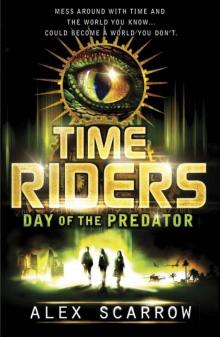 Day of the Predator
Day of the Predator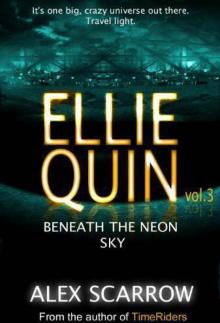 Ellie Quin Book 3: Beneath the Neon Sky
Ellie Quin Book 3: Beneath the Neon Sky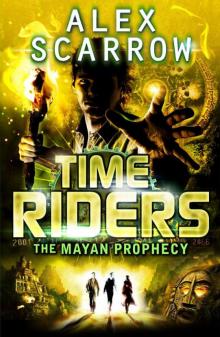 The Mayan Prophecy
The Mayan Prophecy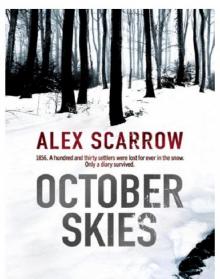 October Skies
October Skies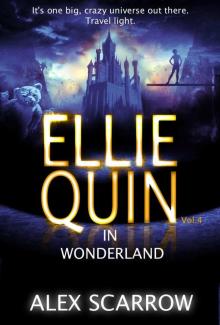 Ellie Quin Episode 4: Ellie Quin in WonderLand (The Ellie Quin Series)
Ellie Quin Episode 4: Ellie Quin in WonderLand (The Ellie Quin Series)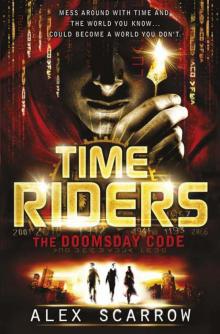 Time Riders
Time Riders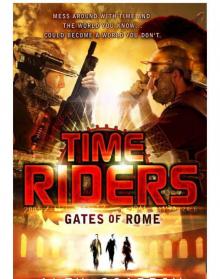 Gates of Rome
Gates of Rome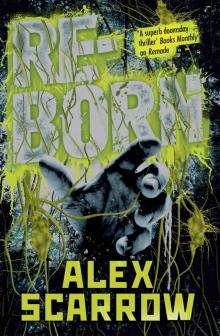 Reborn
Reborn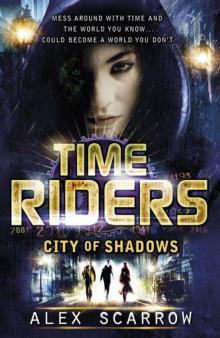 City of Shadows
City of Shadows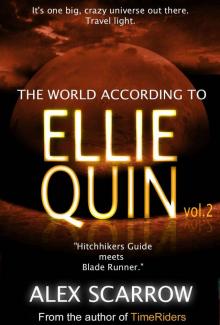 Ellie Quin Book 2: The World According to Ellie Quin (The Ellie Quin Series)
Ellie Quin Book 2: The World According to Ellie Quin (The Ellie Quin Series)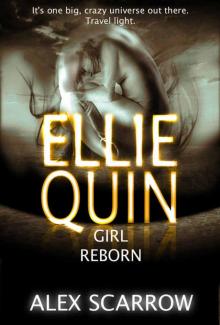 Ellie Quin Episode 5: A Girl Reborn
Ellie Quin Episode 5: A Girl Reborn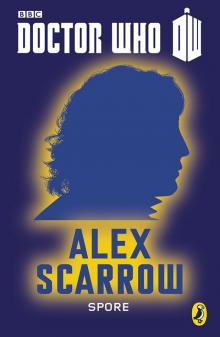 Spore
Spore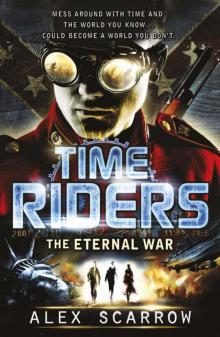 The Eternal War
The Eternal War Last Light
Last Light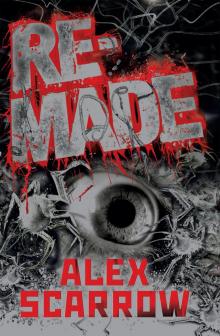 Remade
Remade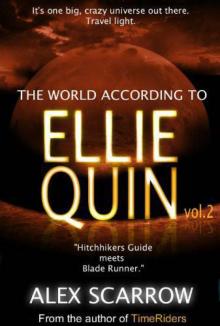 Ellie Quin Book 2: The World According to Ellie Quin
Ellie Quin Book 2: The World According to Ellie Quin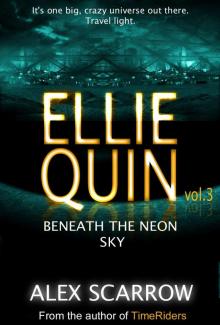 Ellie Quin Book 3: Beneath the Neon Sky (The Ellie Quin Series)
Ellie Quin Book 3: Beneath the Neon Sky (The Ellie Quin Series)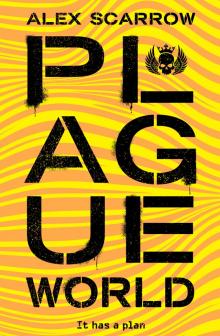 Plague World
Plague World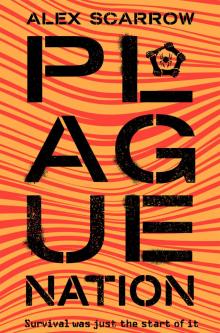 Plague Nation
Plague Nation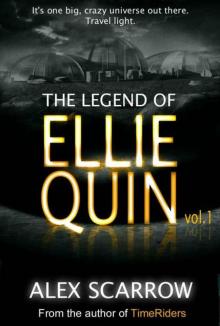 Ellie Quin Book 01: The Legend of Ellie Quin
Ellie Quin Book 01: The Legend of Ellie Quin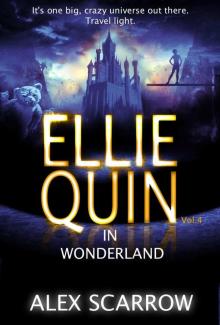 Ellie Quin - 04 - Ellie Quin in WonderLand
Ellie Quin - 04 - Ellie Quin in WonderLand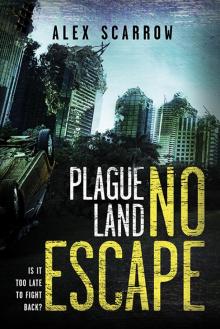 No Escape
No Escape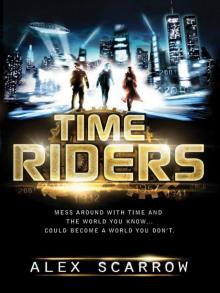 TimeRiders
TimeRiders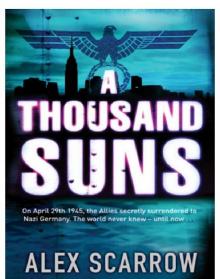 A Thousand Suns
A Thousand Suns The Candle Man
The Candle Man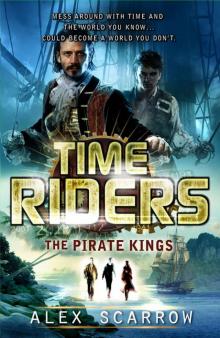 The Pirate Kings
The Pirate Kings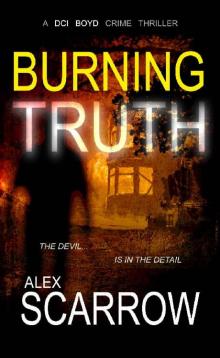 Burning Truth: An Edge-0f-The-Seat British Crime Thriller (DCI BOYD CRIME THRILLERS Book3) (DCI BOYD CRIME SERIES)
Burning Truth: An Edge-0f-The-Seat British Crime Thriller (DCI BOYD CRIME THRILLERS Book3) (DCI BOYD CRIME SERIES)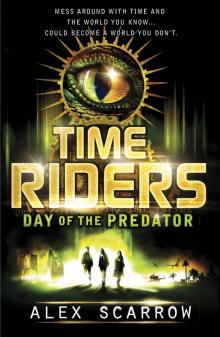 Day of the Predator tr-2
Day of the Predator tr-2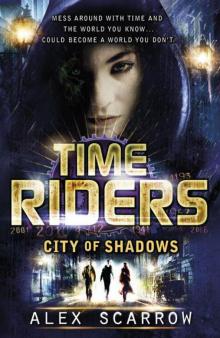 City of Shadows tr-6
City of Shadows tr-6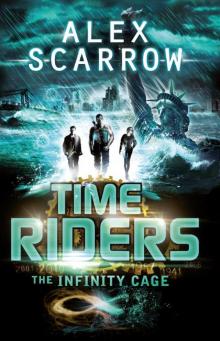 TimeRiders: The Infinity Cage (book 9)
TimeRiders: The Infinity Cage (book 9)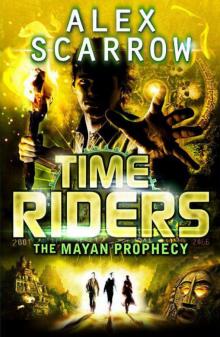 The mayan prophecy (Timeriders # 8)
The mayan prophecy (Timeriders # 8)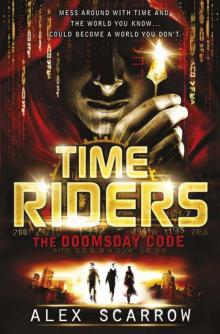 TimeRiders: The Doomsday Code (Book 3)
TimeRiders: The Doomsday Code (Book 3)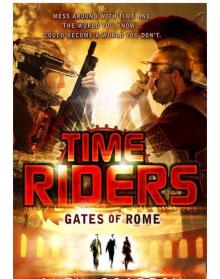 Gates of Rome tr-5
Gates of Rome tr-5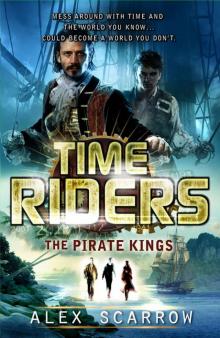 TimeRiders: The Pirate Kings (Book 7)
TimeRiders: The Pirate Kings (Book 7)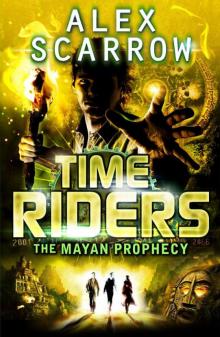 TimeRiders: The Mayan Prophecy (Book 8)
TimeRiders: The Mayan Prophecy (Book 8)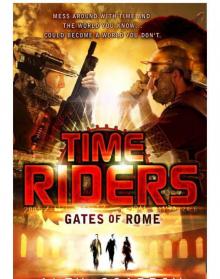 TimeRiders 05 - Gates of Rome
TimeRiders 05 - Gates of Rome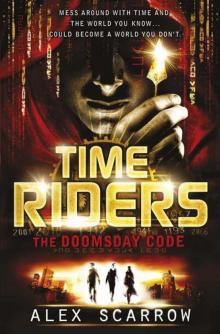 The Doomsday Code tr-3
The Doomsday Code tr-3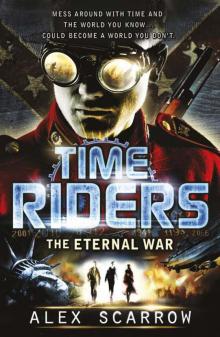 The Eternal War tr-4
The Eternal War tr-4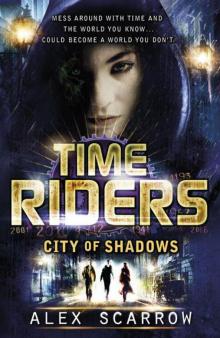 TimeRiders: City of Shadows (Book 6)
TimeRiders: City of Shadows (Book 6)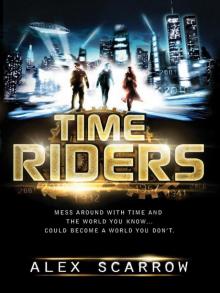 Time Riders tr-1
Time Riders tr-1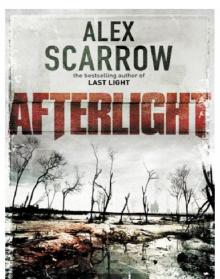 Afterlight
Afterlight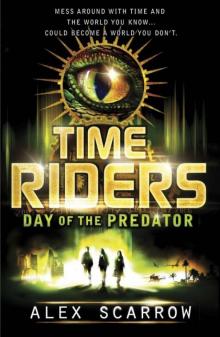 TimeRiders, Day of the Predator
TimeRiders, Day of the Predator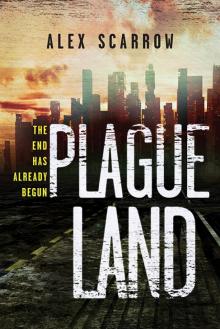 Plague Land Series, Book 1
Plague Land Series, Book 1